
Preamble to the United States Constitution, adopted in 1786. The full preamble reads: “We the People of the United States, in Order to form a more perfect Union, establish Justice, insure domestic Tranquility, provide for the common defence, promote the general Welfare, and secure the Blessings of Liberty to ourselves and our Posterity, do ordain and establish this Constitution for the United States of America.” Image: Wikipedia.
By James Myers
For most of the nearly two thousand years since its establishment, the church was a powerful force in politics. Priests could sway their flocks in one political direction or another, and there were pivotal times in history when the Pope’s decree moved kings, queens, and nations.
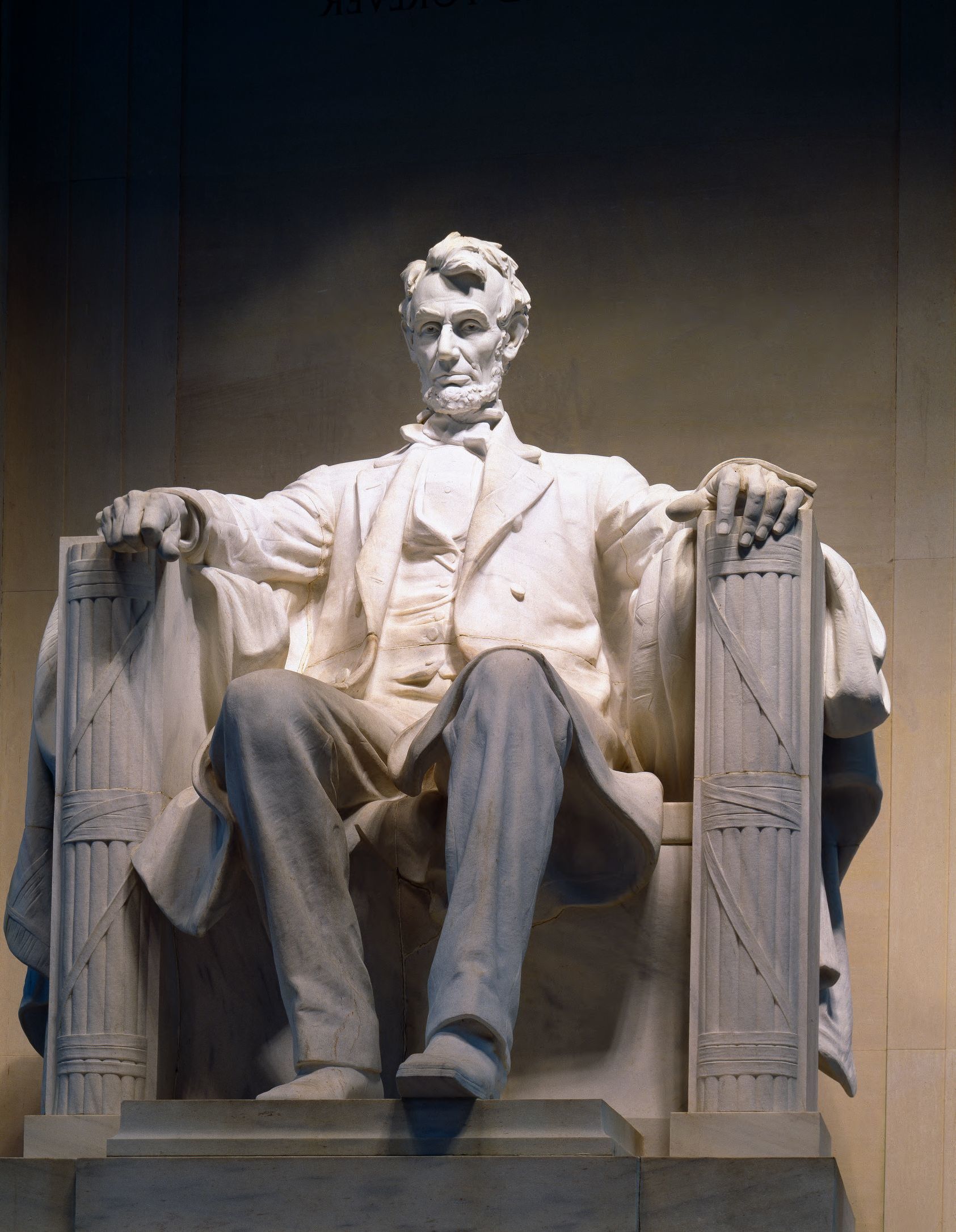
Statue of Abraham Lincoln at the Lincoln Memorial, in Washington, DC. Honouring the memory of those who died in the civil war that ended slavery in the United States, President Lincoln’s Gettysburg Address appealed to the power of the people: “…that this nation, under God, shall have a new birth of freedom—and that government of the people, by the people, for the people, shall not perish from the earth.” Photo by Carol Highsmith, from US National Parks Service.
The long era when the interests of church and state intertwined ended centuries ago in most nations, leaving more power to the people. Power of the people is the constitutional principle of nations that call themselves democracies (even if they don’t practise democracy), but other powerful forces sometimes mix with politics and threaten to extinguish the power of the people.
Undeniably, technology is now a powerful force – for good and for bad – that has radically changed the way humans around the planet live, communicate, and think. The power of technology and leaders of large tech companies has extended rapidly around the globe since the beginning of the twenty-first century, as the internet and broadband connections became widely available.
To be sure, the many benefits of technology are clear to see. Medical technologies have extended lives and brought many once-deadly diseases under control. Space technologies have vastly expanded our understanding of humanity’s place in the cosmos. Many tasks that once required manual labour have been automated. Financial transactions are now completed at lightspeed.
Technological dangers are also clearly evident. The prevalence of ‘social’ media and advertising-driven algorithmic search recommendations has been particularly damaging to democratic government. The ascendance of these media platforms over the past twenty-five years has combined with a general lack of historical perspective and an unwillingness – or inability – of the people to enact regulations for their own greater good. The result is the current global crisis in governance.
‘Social’ media, most particularly Facebook which is used daily by 2 billion people – one quarter of Earth’s population – has not been a force for social good. There are no serious arguments that ‘social’ media has strengthened democracy.
The infestation of anonymous actors, bots, agents of hostile governments, and hateful and abusive speech broadcast freely and widely on ‘social’ media platforms has coarsened political discourse and polarized opinions in ways that would have been unimaginable for those of us who lived in the era Before The Internet (BTI).

Photograph of rioters storming the U.S. Capitol on January 6, 2020. Is this the way of government of the future? Image shared by Reuters .
For example, it would have been unthinkable in the 1980s that a presidential candidate would call his opponent a “shit vice president” or spread a blatant lie with zero evidence that an election that he lost by 6 million votes was “stolen” from him. After The Internet (ATI), however, such behaviour has been normalized and accepted by vast numbers of people who believe without question the antics that play out on their screens. BTI, it would have been unimaginable that a losing presidential candidate would encourage his supporters to an insurrection at the U.S. Capitol in an attempt to prevent Congress from certifying the election results, but ATI he was rewarded with a second term in office and one of his first actions was to pardon the insurrectionists.
Coarse, dehumanizing, and polarizing political statements such as this, made during the 2024 US presidential election, are enabled and normalized by ‘social’ media where they are widely broadcast.
The people need protection from powerful interests
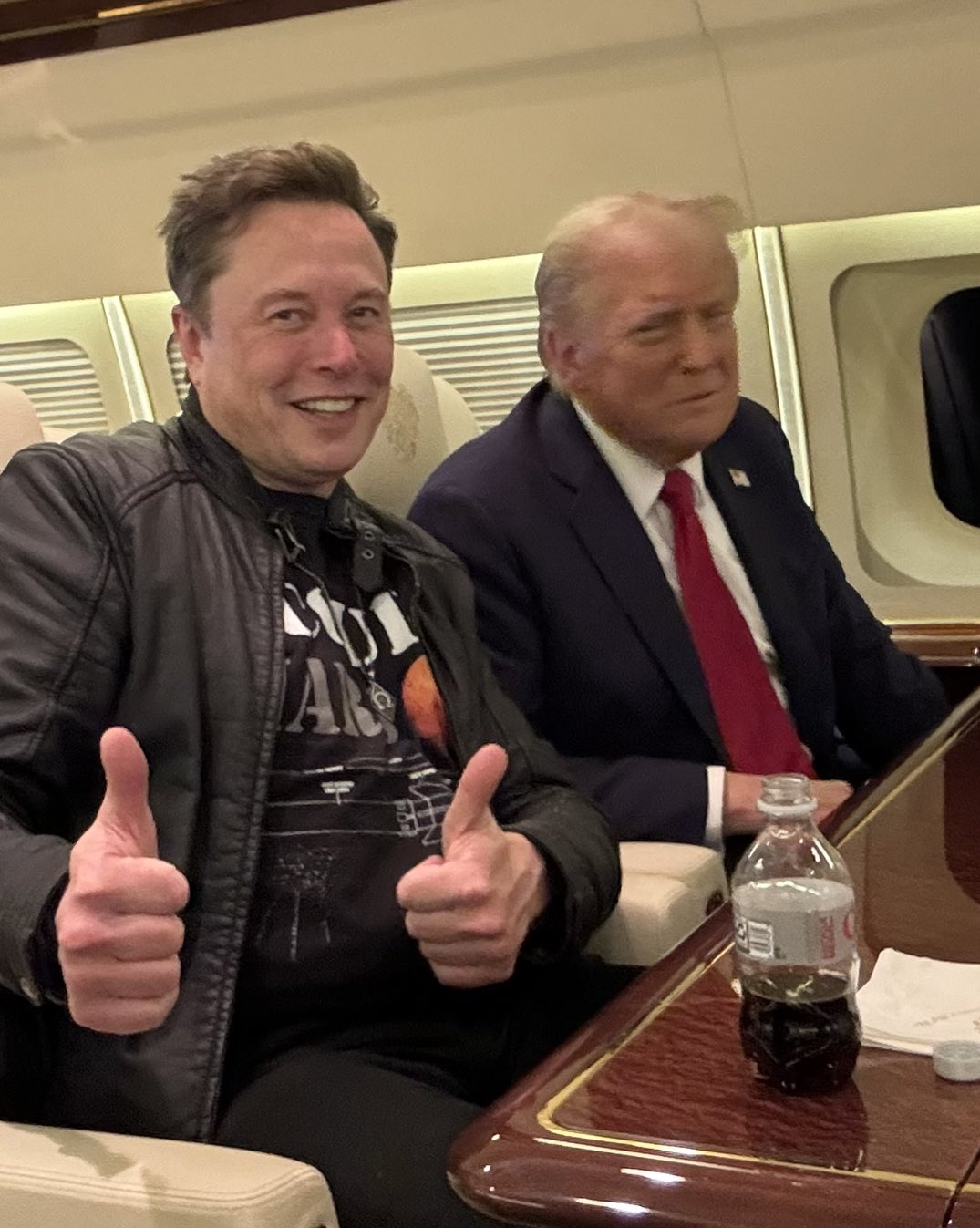
Elon Musk, the wealthiest person on Earth, left, enjoys the attention of the president-elect in November 2024. Image: Office of Speaker Mike Johnson, on Wikipedia.
Separation of politics and powerful interests is a principle that extends far beyond the historical case of church and state. Now, the leaders of a small number of massive and extremely profitable tech companies are undeniably powerful political forces.
We should look to history to avoid repeating mistakes when special interests overwhelm government of the people, by the people, for the people. It is our duty, as it was Abraham Lincoln’s, to act so that government of, by, and for the people never perishes from this Earth.
Protecting government of, by, and for the people is far less burdensome than suffering its loss and later trying to regain control. If technology holds the supreme power, the odds would weigh heavily against us human folk if we tried to cancel its authority.
One tech leader, Elon Musk, who is also the wealthiest human on Earth, has been contracted to head the new and controversial United States “Department of Government Efficiency” (DOGE) with a little-defined and unaccountable mission to reduce the civil service, automate work functions, eliminate government regulation, and slash spending.
Musk was one of the world’s six most powerful and wealthiest tech billionaires who flanked the current president at his inauguration in January. Also present with exclusive seats at the event were Facebook CEO Mark Zuckerberg, Apple head Tim Cook, Amazon owner Jeff Bezos, Google leader Sundar Pichai, and OpenAI CEO Sam Altman. Collectively, the net worth of the six individuals is close to $1 trillion.
The power of their tech companies is evident in rapidly mounting profits. Alphabet, the parent company of Google, YouTube, Android, and Chrome, recorded a profit of $100 billion in 2024. Meta, the parent company of Facebook and Instagram, reaped a profit of $62 billion in 2024, a 59% increase from the $39 billion it made in 2023. The profits of these companies were enabled by user data obtained without compensation, generating revenue from advertisers that target users for commercial and political purposes. Nearly 98% of Meta’s $165 billion of revenue was from advertising, and advertising accounted for just over 75% of Alphabet’s $350 billion of revenue.
No other companies in human history have recorded such astronomical revenues and profits.
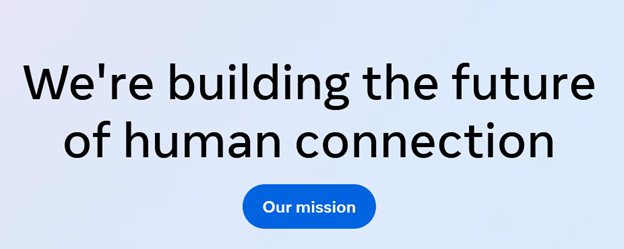
Statement on Meta’s home page. Is the future they’re building in our best interest?
The tech moguls have a significant financial stake in political outcomes. Amazon contracts its cloud computing service to the U.S. government, and Musk-owned SpaceX reports that it has about $22 billion in U.S. government contracts. A landmark July 2024 antitrust ruling declared that Google – which provides about 90% of the world’s web searches – is operating an illegal monopoly with its advertising technology tools. The court is waiting for the federal department of justice to recommend remedial action that could include breakup of the company.

President Thomas Jefferson coined the term separation of church and state. He wrote, “I contemplate with sovereign reverence that act of the whole American people which declared that their legislature should ‘make no law respecting an establishment of religion, or prohibiting the free exercise thereof,’ thus building a wall of separation between Church & State.” Painting by Charles Willson Peale, on Wikipedia.
Google, Amazon, Meta, Microsoft, Tim Cook, Sam Altman, and Mark Zuckerberg each contributed $1 million to the presidential inauguration fund, which is not required to provide an accounting of its expenses. It is reported that the fund collected over $170 million, a record amount that is supposed to cover only the cost of inauguration day events
Shortly after the inauguration, Meta paid $22 million to the Trump presidential library fund to settle what was widely thought to be a spurious lawsuit by the president over his banishment from Facebook following the 2021 insurrection. This month, Elon Musk and his ‘social’ media platform X paid the president $10 million to settle a similar lawsuit, although the president said the amount was “very low. I was looking to get much more money than that.”
Amazon is reported to have paid $40 million for a documentary about the president’s wife, who will act as executive producer for an undisclosed amount of compensation. The president, who has pledged to make America the cryptocurrency “capital of the world,” used technology to issue a “memecoin” called $Trump three days before his inauguration. $Trump reportedly raised $100 million in trading fees from over 200,000 enthusiasts when 80% of the issue – and profit – was reserved for the president’s company.
In the days before the 2024 election, Elon Musk furnished a daily $1 million award for selected individuals who volunteered to be spokespersons for the billionaire’s political action committee in support of presidential candidate Trump. The scheme has been the subject of lawsuits claiming it was an illegal lottery. Musk is reported to have contributed $277 million to his political action committees supporting the election of the president and Republican candidates.
As we noted in a November 2024 editorial, Musk has greenlit his postings on X. Musk’s thoughts and political views, recently broadcast at the rate of 40 times daily, arrive on the screens of over two hundred million X users whether they want to see them or not.
Musk’s political interests extend beyond the U.S.
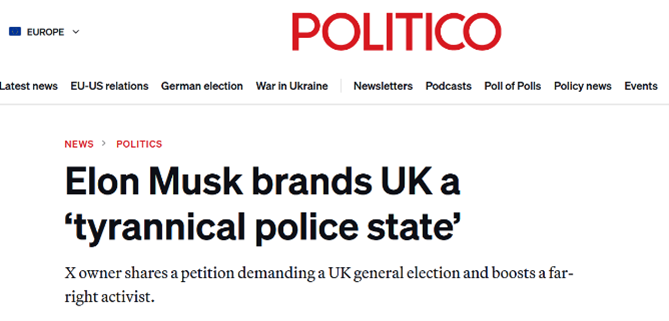
Musk has used his platform in an attempt to sway British politics, and took an active role in support of an opposition party in Germany. In the February 23 German election, that opposition party, Alternative for Germany (AfD), became the second largest in the German Bundestag.
In a livestream with the AfD leader, Musk stated, “Only AfD can save Germany, end of story, and people really need to get behind AfD, and otherwise things are going to get very, very much worse in Germany.”
Within the U.S. government, Musk’s power is becoming deeply entrenched.
Musk’s leadership of DOGE has so far been conducted with no standards for accountability and little regard to respect, due process, and basic rights of government employees. This month, DOGE e-mailed all federal workers demanding they submit a list of five accomplishments in the previous week. In a message posted on X, Musk threatened non-compliant employees with termination.

Washington Post headline on February 23, 2025.
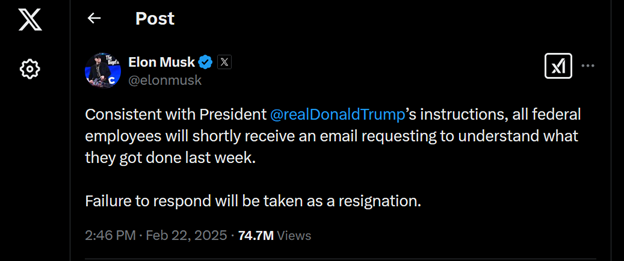
Protecting government of the people, by the people, for the people is not a corporate objective.
Without legal and government protection, billions of people would be left with no means to defend themselves against harmful and potentially damaging actions of large and powerful tech companies.
In recent weeks, Facebook has demonstrated how giant tech companies make decisions unilaterally and without consultation that have profound consequences for users. For many years, the company had promoted its diversity, equity, and inclusion practices, however among the president’s inaugural day executive orders was the elimination of diversity, equity, and inclusion throughout the government’s vast administrative network. Using this turning of the tide as his reason, Facebook CEO Mark Zuckerberg announced the elimination of the company’s U.S.-based human fact-checkers in favour of less costly and less responsive algorithmic moderation for Facebook’s two billion daily users.
As all Facebook users know, even with human and algorithmic moderation combined, some awful and incredibly damaging things still get through.

This claim on Meta’s website begs the question: for whose benefit is the positive impact?
There is a clear need for ‘social’ media content moderation. Musk-owned X has recently disclosed that in the first six months of 2024 it received 224 million complaints of different forms of abusive behaviour. Sixty-seven million of those reports were for hateful content, and violent content was the subject of 40 million complaints.
When Zuckerberg announced the elimination of human fact-checkers on January 7, two weeks before the presidential inauguration, he stated that fact-checking has resulted in “too much censorship.” In a video, he stated, “Fact-checkers have just been too politically biased and have destroyed more trust than they’ve created,” without supplying evidence of the bias he claimed.
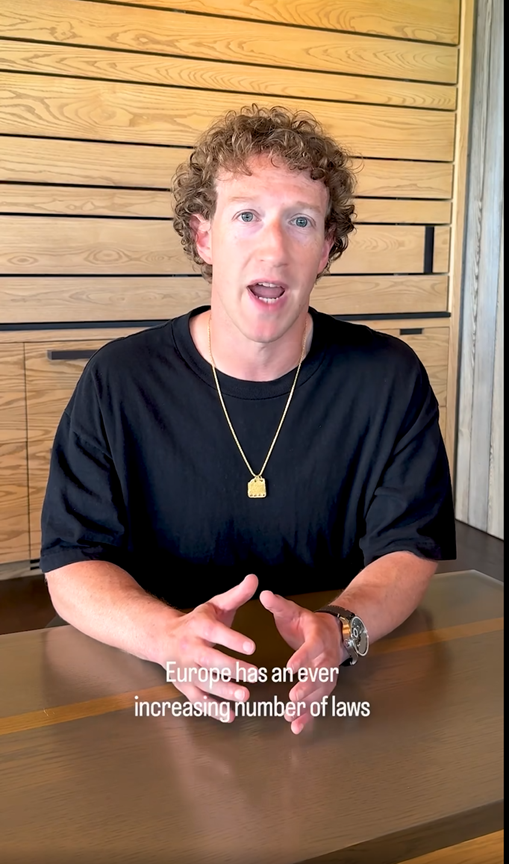
Looking uncommonly hip in a t-shirt, gold chain, expensive watch, and hair no longer closely-cropped, Meta CEO Mark Zuckerberg announces the elimination of human content moderation in the U.S. Watch the 5:18 minute announcement on Facebook at https://fb.watch/xvia4wiwBW/.
At the same time, Zuckerberg acknowledged, “There’s also a lot of legitimately bad stuff out there – drugs, terrorism, child exploitation – these are things we take very seriously and I want to make sure we handle responsibly. So we built a lot of complex systems to moderate content, but the problem with complex systems is they make mistakes. Even if they accidentally censor just 1% of posts, that’s millions of people, and we’ve reached a point where it’s just too many mistakes and too much censorship.”
Many people would disagree with Zuckerberg’s disparagement of content moderation as “censorship,” and with his claim that there was excessive moderation.
In the video, Zuckerberg stated, “The recent elections also feel like a cultural tipping point towards once again prioritizing speech. So we’re going to get back to our roots and focus on reducing mistakes, simplifying our policies, and restoring free expression on our platforms.”
What he didn’t acknowledge, ironically, is that his platforms – particularly Facebook, Instagram, and WhatsApp – have facilitated and fuelled that tipping point by coarsening political discourse, polarizing opinions, and giving a free outlet to hateful and harmful speech. Those ills have now been embraced as “free expression.” The irony is deepened because, recognizing the public danger that the president posed for “praising the people engaged in violence at the Capitol on January 6, 2021,” Zuckerberg had banned the then-former president from Facebook.
We can no longer turn a blind eye. Human-technological co-existence for the long term is something we now have to defend.
Technology is a powerful force in our lives. Who among us could function without the internet, without online banking, without cell phones, without computers, and without GPS navigation, among many other daily needs?
One risk in technology’s evolution is that its operations have become so complex that often only a few people with years of training and experience understand them. Sometimes, as with so-called “blackbox” technologies, some of the processes that produce their outputs are unknown to any human.
Another thing about technology is that it has made us all victims of fraud, impersonation, scamming, spamming, hacking, ransomware attacks, and the list goes on as the problems grow worse and more pervasive by the day. As we noted in our December article, Growing Up Online: Evolving Protections for Children in the Digital World, children are particularly at risk to technological exposure and abuse.
Separation of church and state came about after centuries of friction, generated by sometimes heated differences between the interests of priests and politicians. Much friction over a different set of interests is now building between tech companies and governments of, by, and for the people. Not only did separation of church and state centuries ago advance the practice of democracy, the disentangling of their mixed interests created far better odds of their co-existing. It was a compromise for the church, but one that worked out better for it in the end, and it stands as a lesson for tech companies too.
The people – and government of the people, by the people, for the people – clearly need protection. Government capture by any special interest must be prevented. In the long term, separation of tech and state would serve the interests of the tech companies, because it’s becoming clear that the current trajectory cannot be sustained for long.
We must never surrender our ability to communicate, human to human, on our own human terms. We must never lose knowledge of who – or what – we’re communicating with and its motives. To do so would to become like the prisoner in the cave, from Plato’s famous allegory, and like the prisoner to mistake for reality the two-dimensional images projected on our screens by unseen men.



